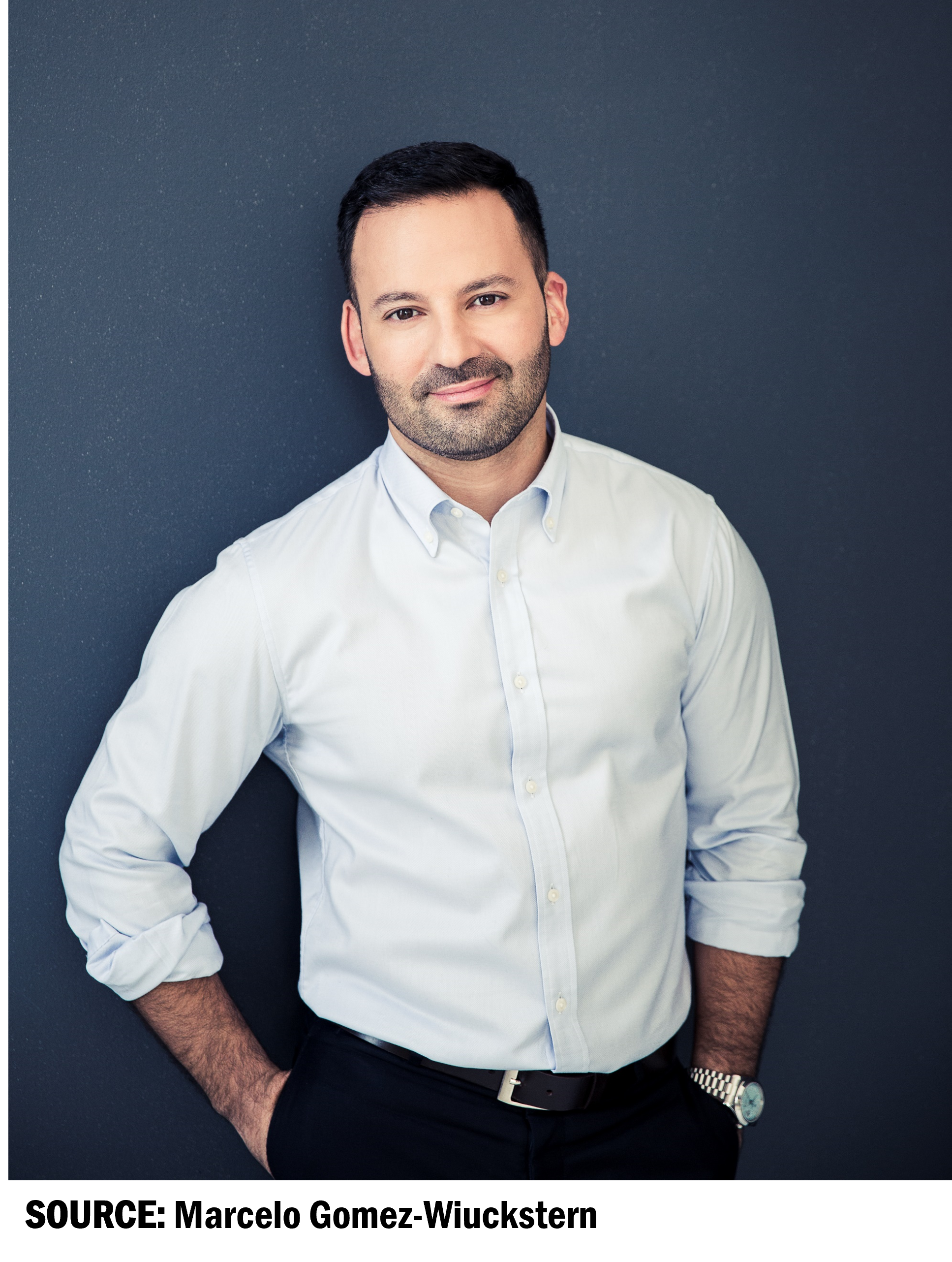Important: The GCConnex decommission will not affect GCCollab or GCWiki. Thank you and happy collaborating!
Difference between revisions of "CNOLC-newsletter-no2/interview"
Anik.sauve (talk | contribs) |
Anik.sauve (talk | contribs) |
||
| Line 82: | Line 82: | ||
| − | <span style="font-size:16px"><span style="font-family:Franklin Gothic, Demi Cond, sans-serif">''' | + | <span style="font-size:16px"><span style="font-family:Franklin Gothic, Demi Cond, sans-serif">'''Marcelo, thank you for agreeing to take part in this interview. First of all, how long have you been the Official Languages Champion? How does this role manifest itself in your daily life?''' |
<span style="font-size:16px"><span style="font-family:Franklin Gothic, Demi Cond, sans-serif">''' ''' | <span style="font-size:16px"><span style="font-family:Franklin Gothic, Demi Cond, sans-serif">''' ''' | ||
| − | <br><span style="font-size:16px"><span style="font-family:Georgia,serif">I | + | <br><span style="font-size:16px"><span style="font-family:Georgia,serif">I have been with Canada Lands Company for almost five years and took on this important mandate shortly after joining the company. We have offices and operations across the country in both real estate development and attractions management. Our priority is to ensure that we adhere to the ''Official Languages Act'' on a daily basis. Whether we organize public engagement events, work with official language minority communities or communicate with the public, we must always be vigilant. Our real estate projects often attract the attention of various linguistic communities and our attractions bring in visitors from across the country and internationally, so reflecting on Canada’s linguistic duality is important for us.</span></span> |
| + | <span style="font-size:16px"><span style="font-family:Franklin Gothic, Demi Cond, sans-serif">''' ''' | ||
<br> | <br> | ||
| − | <p><span style="font-size:16px"><span style="font-family:Franklin Gothic, Demi Cond, sans-serif">''' | + | <p><span style="font-size:16px"><span style="font-family:Franklin Gothic, Demi Cond, sans-serif">'''Since your arrival, you have overseen the implementation of measures to ensure that official languages are an integral part of your organization. Can you discuss your approach and the initiatives you have put forward?'''</p> |
| − | <br><span style="font-size:16px"><span style="font-family:Georgia,serif"> | + | <span style="font-size:16px"><span style="font-family:Franklin Gothic, Demi Cond, sans-serif">''' ''' |
| + | <br><span style="font-size:16px"><span style="font-family:Georgia,serif">I grew up in Québec in French, and one of my first jobs was at a Francophone television station in Ontario. That work experience allowed me to discover the vitality of Francophone minority communities and better understand the importance of promoting French across the country.</span></span> | ||
| + | |||
| + | <span style="font-size:16px"><span style="font-family:Franklin Gothic, Demi Cond, sans-serif">''' ''' | ||
| + | |||
| + | |||
| + | <span style="font-size:16px"><span style="font-family:Georgia,serif">In 2019, Canada Lands Company conducted an internal audit, with the help of a consultant, to better understand our strengths and weaknesses regarding the compliance with the ''Official Languages Act.'' This exercise showed us there was room for improvement within the Company and its divisions. As a result, we strengthened our policies and procedures, provided further resources available to employees who wish to work in the official language of their choice and provided more training to employees on our collective obligations under the Act.</span></span> | ||
| + | <span style="font-size:16px"><span style="font-family:Franklin Gothic, Demi Cond, sans-serif">''' ''' | ||
<br> | <br> | ||
| − | <span style="font-size:16px"><span style="font-family:Georgia,serif"> | + | <br><span style="font-size:16px"><span style="font-family:Georgia,serif">The commitment of Canada Lands Company’s Board of Directors and the senior management team in making official languages a priority makes the whole difference—not because it is the law, but because we all believe in the importance of promoting linguistic duality.</span></span> |
| − | + | ||
| − | < | + | <span style="font-size:16px"><span style="font-family:Franklin Gothic, Demi Cond, sans-serif">''' ''' |
| + | |||
| + | <br><span style="font-size:16px"><span style="font-family:Franklin Gothic, Demi Cond, sans-serif">'''In closing, what to you appreciate the most about your role as Official Languages Champion?''' | ||
| + | |||
| + | <span style="font-size:16px"><span style="font-family:Franklin Gothic, Demi Cond, sans-serif">''' ''' | ||
| + | <br><span style="font-size:16px"><span style="font-family:Georgia,serif">This important role allows me to have a direct impact on not only Canada Lands Company, but, more importantly, on communities and the linguistic duality of our country.</span></span> | ||
| + | |||
| + | <span style="font-size:16px"><span style="font-family:Franklin Gothic, Demi Cond, sans-serif">''' ''' | ||
| + | |||
| − | + | <span style="font-size:16px"><span style="font-family:Georgia,serif">Most of all, I love seeing tangible results. I see our employees working hard everywhere to promote and protect both official languages. Whether it be by displaying bilingual signage, providing services to the public or working with communities to enable the establishment of new Francophone schools, each success is a victory for our country. My colleagues support and celebrate this work. We aim for linguistic duality in all our operations and want minority communities to feel included when they visit our attractions and live in our communities.</span></span> | |
| − | |||
| − | |||
| − | |||
| − | |||
| − | + | <span style="font-size:16px"><span style="font-family:Franklin Gothic, Demi Cond, sans-serif">''' ''' | |
| − | |||
| − | <br><span style="font-size:16px"><span style="font-family:Franklin Gothic, Demi Cond, sans-serif">''' | + | <br><span style="font-size:16px"><span style="font-family:Franklin Gothic, Demi Cond, sans-serif">'''Thank you for this interview. We are certain that some of our readers will be inspired by the approach you have taken in your organization.''' |
<p> </p> | <p> </p> | ||
Revision as of 09:24, 10 June 2022
INTERVIEW WITH AN OFFICIAL LANGUAGES CHAMPION
Please meet Marcelo Gomez-Wiuckstern, Official Languages Champion at the Canada Lands Company.
Marcelo Gomez-Wiuckstern is Vice President, Corporate Communications. He has more than 20 years of experience in communications, reputation management, public affairs and marketing in the private and public sectors. Before joining Canada Lands Company, Marcelo was Director of Communications, International Banking and Digital Transformation at Scotiabank. Marcelo holds a Bachelor in Business Administration (HEC Montreal), a Masters in Communications (UQAM). He has also completed Harvard Business School’s Program for Leadership Development.
Marcelo, thank you for agreeing to take part in this interview. First of all, how long have you been the Official Languages Champion? How does this role manifest itself in your daily life?
I have been with Canada Lands Company for almost five years and took on this important mandate shortly after joining the company. We have offices and operations across the country in both real estate development and attractions management. Our priority is to ensure that we adhere to the Official Languages Act on a daily basis. Whether we organize public engagement events, work with official language minority communities or communicate with the public, we must always be vigilant. Our real estate projects often attract the attention of various linguistic communities and our attractions bring in visitors from across the country and internationally, so reflecting on Canada’s linguistic duality is important for us.
Since your arrival, you have overseen the implementation of measures to ensure that official languages are an integral part of your organization. Can you discuss your approach and the initiatives you have put forward?
I grew up in Québec in French, and one of my first jobs was at a Francophone television station in Ontario. That work experience allowed me to discover the vitality of Francophone minority communities and better understand the importance of promoting French across the country.
In 2019, Canada Lands Company conducted an internal audit, with the help of a consultant, to better understand our strengths and weaknesses regarding the compliance with the Official Languages Act. This exercise showed us there was room for improvement within the Company and its divisions. As a result, we strengthened our policies and procedures, provided further resources available to employees who wish to work in the official language of their choice and provided more training to employees on our collective obligations under the Act.
The commitment of Canada Lands Company’s Board of Directors and the senior management team in making official languages a priority makes the whole difference—not because it is the law, but because we all believe in the importance of promoting linguistic duality.
In closing, what to you appreciate the most about your role as Official Languages Champion?
This important role allows me to have a direct impact on not only Canada Lands Company, but, more importantly, on communities and the linguistic duality of our country.
Most of all, I love seeing tangible results. I see our employees working hard everywhere to promote and protect both official languages. Whether it be by displaying bilingual signage, providing services to the public or working with communities to enable the establishment of new Francophone schools, each success is a victory for our country. My colleagues support and celebrate this work. We aim for linguistic duality in all our operations and want minority communities to feel included when they visit our attractions and live in our communities.
Thank you for this interview. We are certain that some of our readers will be inspired by the approach you have taken in your organization.





